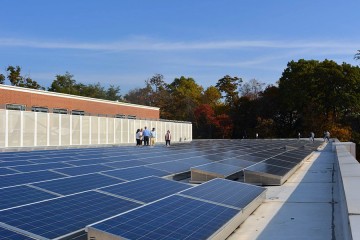Johns Hopkins University will divest from its separately managed holdings in thermal coal, following a vote from the board of trustees Friday.
The board's vote directs the university to stop buying the stocks and bonds of companies that produce coal for electric power as a major part of their business, and to sell from its endowment or other investments any securities it directly owns from those companies, on a schedule that minimizes financial loss.
The board decision responds to a student group's divestment proposal and more than two years of campus debate on whether Johns Hopkins should hold securities related to fossil fuels. Scientists have determined that burning those fuels contributes to global climate change.
The trustee vote applies to companies that produce thermal coal, the type burned to generate electricity. Thermal coal has been found to contribute more to the production of greenhouse gases per unit of electricity than any other fossil fuel, in addition to its harmful effect on public health.
"This decision places Johns Hopkins within a relatively small group of university peers that have made public divestment commitments related to sustainability and affirms our institutional dedication to the issue," said Ronald J. Daniels, president of the university.
The vote marks only the third time in the university's history that the trustees have barred a particular type of investment because of broad social concerns. In the 1980s, Johns Hopkins divested from companies doing business in the then-apartheid state of South Africa. In 1991, the trustees voted to end all direct investments in tobacco company stocks and bonds.
"In taking this rare step, the trustees determined that thermal coal poses a unique threat to public health and to the environment," Daniels said.
Daniels said he greatly appreciated the role of the student organization Refuel our Future in advocating for fossil fuel divestment. The group submitted a formal proposal to the university's Public Interest Investment Advisory Committee in December 2015.
PIIAC studied the Refuel our Future proposal and related issues, and in September recommended that Johns Hopkins divest from all Carbon Underground 200 companies. The CU200 are "the top publicly traded coal, oil, and gas reserve owners ranked by the potential carbon emissions content of their reported reserves."
The trustees decided to divest from thermal coal producers, rather than the entire CU200, in an effort to balance an important stand in the fight against climate change against a fiduciary duty to maximize support for the university's teaching, research, and patient care missions. Singling out coal eliminates investments in the one fossil fuel that contributes more climate-changing greenhouse gases per unit of electricity than any other, the university said.
"The board of trustees strongly believes that this public and explicit stance will help propel the weight of public opinion toward accelerating the transition away from coal as a source of electric power around the globe," the trustees said in a communication to PIIAC.
The divestment decision aligns with efforts the university has undertaken since 2010, when it announced a commitment to cut emissions of climate-changing carbon dioxide gas by 2025 to less than half of projected levels. To move toward the goal, Johns Hopkins has built cogeneration plants on the Homewood and East Baltimore campuses; installed thousands of solar panels on those campuses and at its Keswick, Eastern, and Mount Washington facilities; committed to strive for at least LEED Silver certification on all new buildings and major renovation projects; and made significant investments in efficient lighting, vehicle fuel efficiency, and central plant efficiency.
The university has also invested in programs and academic concentrations related to environmental science and energy policy at four schools, and faculty have engaged in federally funded research on topics ranging from the effects of ozone depletion to innovative fuel cells.
Friday's decision bars future purchase of stocks or bonds of companies that earn more than 35 percent of their revenue from thermal coal, the type burned to generate electricity. The university also will not buy into any partnerships with 35 percent of more of their total investment in companies whose primary business is to produce thermal coal.
Posted in University News, Politics+Society, News+Info
Tagged sustainability, climate change, fossil fuels











